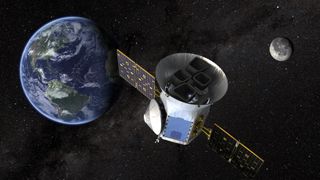
The Transiting Exoplanet Survey Satellite (TESS)
Midway through last year, NASA launched a new object into space called the The Transiting Exoplanet Survey Satellite (TESS). The purpose of this machine is to fly throughout space and find new planets nearby the Sun. With this is mind, one huge question would be if there is life on those other planets If there isn’t life on those planets, could the planet still harbor life in the future?
After looking into the different requirements for establishing life on other planets, I stumbled upon a brief list of criteria that a planet should satisfy in order to culture life.
Temperature: Temperature is a very important qualifier for life developing on other planets. Naturally, if a planet is too cold, very few – if any – organisms would be able to survive. One of the main reasons for this is that water would be unable to exist in a liquid state. Temperature, however, also plays a role in the development of life. With lower temperatures, molecules move much slower which causes reactions to happen less frequently. These important chemical reactions are important in the development of life, so if they happen slower, it might take much longer for there to be potential for life. Likewise, if the temperature is too hot, it will cause molecules to break down before they are able to form something that resembles life.
Water: Water is also an extremely important necessity for life. Since water allows the transportation of chemicals and other resources throughout cells, it is important for the water to be liquid. This, in turn, relies on the temperature being correct.
Atmosphere: The atmosphere of a planet can immediately determine whether a planet can contain life. If the planet simply doesn’t have an atmosphere, it makes the planet vulnerable to external elements such as solar flares and asteroids. If there is too much of an atmosphere, it might capture too much heat and make the surface of the planet uninhabitable. An example of this would be Venus. Its atmosphere is so thick that the surface of the planet is incredibly warm.
Energy: This category refers heavily on sunlight or light from the parent star. If there is too little light, organisms have a high chance of not getting the chemicals they need from sunlight to survive. Naturally, if there is too much energy directed towards the planet there are also issues. Too much energy towards a planet could mean the planet gets too hot depending on how thick the atmosphere is, or the energy could prove harmful towards the organisms.
Since planets must nearly pass all of these criteria, it’s no mystery why so many of them cannot or do not contain life. However, all of these criteria are based on the assumption that our human-defined definition of life is applicable to all organisms throughout the universe. For all we know, there isn’t one set of rules for a living thing. There could be countless variations of life that we simply aren’t aware of.

This is such an interesting topic and one that I used to be really into so it made for a fun read. I tend to forget that projects like this with space exploration are happening now and that maybe we’ll find life somewhere. I like the way you broke down the different factors that they’re looking at to see if there could be life. I knew a little bit about these already and I’ve been interested in learning more, but a lot of the scientific articles get confusing because I don’t have enough background in the topic. Your post was a lot easier to read than those and made sense.
Mike, cool post! I don’t know much about outer space and life on other planets, but your post was very informative and interesting. It makes sense that the criteria you listed are needed for life on a planet. I had not really though much about how having all these criteria in one place could be difficult. It is crazy to think planet Earth is the only place we know of that has extremely advanced organisms. I always wonder if there is more complex life in outer space, and I am definitely hopeful. The Milky Way is only a small part of space, so I’m definitely thinking other advanced organisms are out there!